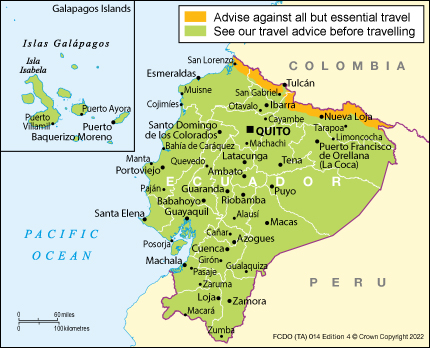Ecuador
Summary

The Foreign, Commonwealth and Development Office (FCDO) advises against all but essential travel to areas within 20km of the Ecuadorean border with Colombia, except:
- the El Angel ecological reserve in Carchi province
- the Rumachica border crossing, the town of Tulcan, and the Pan American Highway in Carchi province
Before you travel, check the ‘Entry requirements’ section for Ecuador’s current entry restrictions and requirements. These may change with little warning. Monitor this advice for the latest updates and stay in contact with your travel provider.
If you plan to pass through another country to return to the UK, check the travel advice for the country you’re transiting.
Travelling to areas within 20km of the Ecuadorean border with Colombia to which the FCDO advises against all but essential travel to carries significant risks due to the presence of organised crime linked to the production and trafficking of drugs.
Since the end of March 2023 there has been a series of small explosions, and also false alarms, in Quito and Guayaquil. Some were detonated by security forces in controlled explosions. The explosions have resulted in some property damage but no injuries or deaths. Should an incident occur near where you are, follow the instructions of police and local authorities.
Due to a series of security incidents in and around the city of Guayaquil, a state of emergency haswas been declared, with effect from 2 April 2023, in Ecuador’s Zone 8. Zone 8 covers the cities of Guayaquil, Samborondón and Duran, and areas in the provinces of Santa Elena and Los Ríos. See map of Ecuador’s Zones here. A curfew is in place from 01:00 to 05:00 local time.
At the end of February 2023, security and crime incidents were reported in Esmeraldas province. A 60 day state of emergency (from 3 March) was declared in Esmeraldas province, with a curfew being in place from 21:00 to 05:00 local time. British visitors are advised to be extra vigilant if travelling to this area and to monitor local news and official instructions. See Crime
The security situation in the areas of Esmeraldas, Carchi and Sucumbios provinces, which lie outside the 20km border zone can change quickly. If you are travelling to these areas, including Cuyabeno, the Napo river, and the El Angel ecological reserve where there are a number of eco lodges, you should take local advice, pay close attention to warnings issued by the Ecuadorean authorities and be particularly cautious and vigilant. Illegal armed groups and criminal gangs are present in these areas. Travelling during daylight hours and with a reputable operator with official guides, emergency plans and good communication systems will reduce risks. Some lodges are a long distance from the nearest major hospital and helicopter evacuation may be necessary in an emergency. See Local travel
In 2019 and 2022, Ecuador saw nationwide political protests. Some protests became violent, especially in Quito, and led to a number of fatalities. Avoid any protests or demonstrations and keep up to date with development via official local sources.
It is more important than ever to get travel insurance and check it provides sufficient cover. See the FCDO’s guidance on foreign travel insurance.
Around 2,500 British nationals visited Ecuador in 2021, and 12,400 between January and September 2022. Most visits are trouble free.
Terrorist attacks in Ecuador cannot be ruled out. See Terrorism
Ecuador is situated in an area of intense seismic activity. There is a high risk of earthquakes, volcanic eruptions and tsunamis. You should make sure you are aware of the risks and are familiar with the relevant safety and evacuation procedures. In the event of a natural disaster, you should monitor official channels – the Ecuadorean National Geophysical Institute and the National Service for Risk and Emergency Management (both Spanish only) – and follow the advice of the local authorities. See Natural disasters
Cases of armed robbery are increasing and petty crime is common. See Crime
UK health authorities have classified Ecuador as having a risk of Zika virus transmission. For more information and advice, visit the website of the National Travel Health Network and Centre website.
If you’re abroad and you need emergency help from the UK government, contact the nearest British embassy, consulate or high commission. Consular support may be limited in parts of Ecuador.
The Overseas Business Risk service offers information and advice for British companies operating overseas on how to manage political, economic, and business security-related risks.